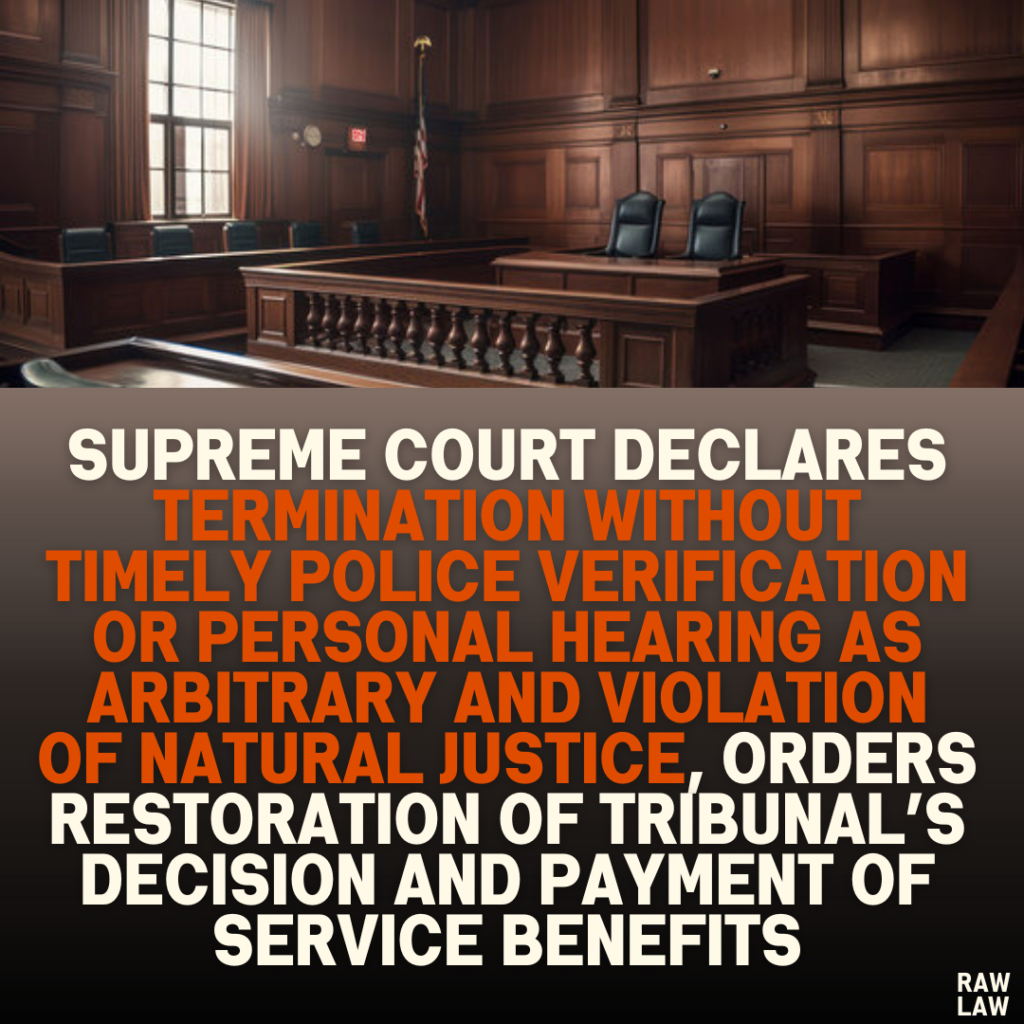Court’s Decision:
The Supreme Court overturned the High Court’s order affirming the appellant’s termination and restored the West Bengal State Administrative Tribunal’s decision, which had invalidated the termination order. The Court found the termination to be arbitrary, in violation of principles of natural justice, and based on a delayed and uncommunicated police report. It directed the payment of all due service benefits to the appellant within three months.
Facts:
- The appellant and his father migrated to India from East Pakistan (now Bangladesh) in 1969, obtaining a migration certificate. The father’s name, and by extension the appellant’s, was included in the certificate.
- The appellant was appointed as a Para Medical Ophthalmic Assistant in 1985 after clearing medical and police verification requirements.
- He served the government for 26 years without any blemish.
- In 2010, a secret police report deemed the appellant “unsuitable” for employment due to alleged nationality concerns. This report was submitted 25 years after his appointment, just two months before his scheduled retirement.
- The appellant was terminated from service in 2011 without being furnished the police report or given a personal hearing.
- The West Bengal State Administrative Tribunal quashed the termination order, but the High Court later reinstated it, prompting the appellant’s appeal to the Supreme Court.
Issues:
- Does the migration certificate and associated documents establish the appellant’s Indian citizenship?
- Was the termination in violation of the principles of natural justice, especially given the absence of a personal hearing and the failure to share the police report?
- Can a delayed police verification report, submitted decades after the appellant’s appointment, justify termination?
Petitioner’s Arguments:
- The appellant argued that his migration certificate, voter ID, Aadhaar card, and other documents proved his Indian citizenship.
- The termination was arbitrary and violated his rights under Articles 14 and 21 of the Constitution.
- The delayed police verification report, which was not shared with him, deprived him of an opportunity to defend himself.
- The lack of a personal hearing rendered the termination invalid.
Respondent’s Arguments:
- The respondents argued that the migration certificate alone did not confer citizenship, as the appellant failed to register for Indian citizenship under the law.
- The termination followed due process, including a show cause notice to which the appellant replied.
- Delay in police verification, though regrettable, did not negate the importance of the report, which concluded the appellant was unsuitable for service.
Analysis of the Law:
1. Citizenship:
- Section 9 of the Foreigners Act, 1946, places the burden of proving citizenship on the person claiming to be an Indian citizen.
- The Court cited Sarbananda Sonowal v. Union of India, which emphasized that evidence of date of birth, place of birth, and parents’ details is essential for proving citizenship.
2. Natural Justice:
- The principles of natural justice require a fair hearing before taking adverse action. The Court relied on precedents like Mazharul Islam Hashmi v. State of U.P., which held that personal hearings are mandatory in cases of termination.
- The absence of reasons in the termination order violated established principles, as highlighted in Kranti Associates v. Masood Ahmed Khan.
3. Timeliness of Police Verification:
- The Court found the 25-year delay in police verification unacceptable and prejudicial to the appellant. It stressed that such reports must be completed promptly to prevent arbitrary decisions, as held in S. Govindaraju v. Karnataka State Road Transport Corporation.
Precedent Analysis:
- Kranti Associates v. Masood Ahmed Khan: Every administrative order affecting rights must provide clear reasons to ensure transparency and fairness.
- Mazharul Islam Hashmi v. State of U.P.: Termination orders require a personal hearing to comply with natural justice principles.
- Aureliano Fernandes v. State of Goa: Even in the absence of explicit rules, natural justice principles must be upheld.
Court’s Reasoning:
- The Court rejected the respondents’ claim that a migration certificate alone was insufficient to establish citizenship. It noted that no proceedings under the Citizenship Act, 1955, or Foreigners Act, 1946, had been initiated to challenge the appellant’s status.
- The termination was procedurally flawed:
- The police report was not shared with the appellant.
- The show cause notice did not specify reasons for unsuitability.
- No personal hearing was granted.
- The delay in police verification was unreasonable and deprived the appellant of his pensionary benefits after 26 years of service.
- The High Court erred in treating the show cause notice and appellant’s reply as compliance with natural justice.
Conclusion:
The Supreme Court declared the appellant’s termination illegal and violative of natural justice, emphasizing that the process was arbitrary and procedurally flawed. It restored the Tribunal’s decision, which had quashed the termination order, and set aside the High Court’s judgment that had upheld it. The Court directed the respondents to pay all pending service benefits, including pension and gratuity, within three months. It reaffirmed the necessity of fair administrative procedures, holding that decisions impacting individuals’ rights must provide clear reasons and follow due process, ensuring justice and accountability in public employment.
Implications:
The judgment strengthens natural justice principles by mandating fair hearing and reasoned administrative decisions, safeguarding employees against arbitrary terminations. It introduced a directive for timely police verification, requiring completion within six months of appointment, to prevent procedural delays from prejudicing employees. Additionally, it reinforced the security of tenure for long-serving employees, ensuring that unsubstantiated or delayed reports cannot justify dismissals or denial of service benefits. The decision promotes procedural fairness and accountability, setting a precedent for transparent and efficient administrative processes across public employment sectors.
